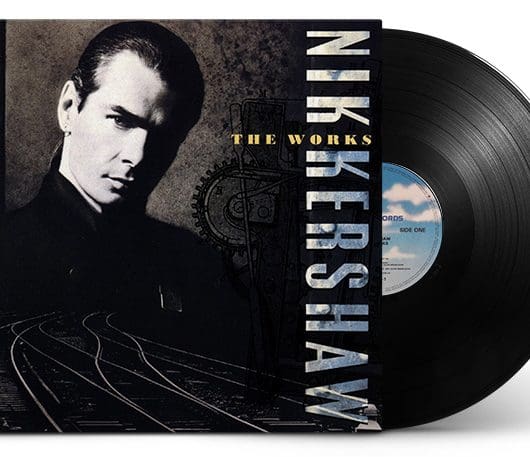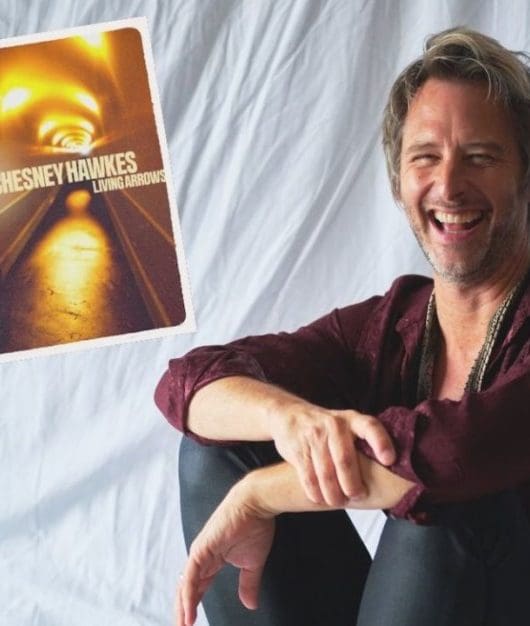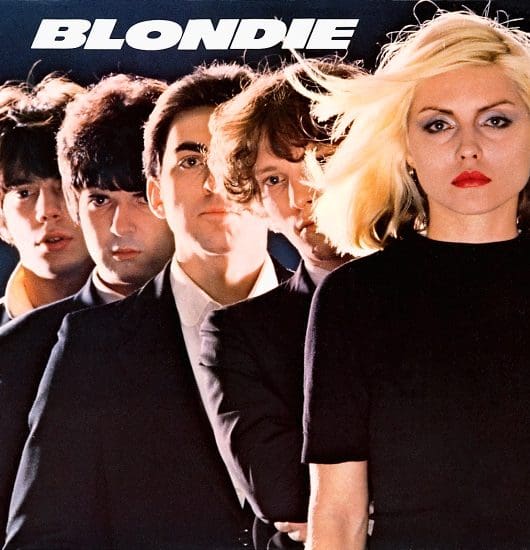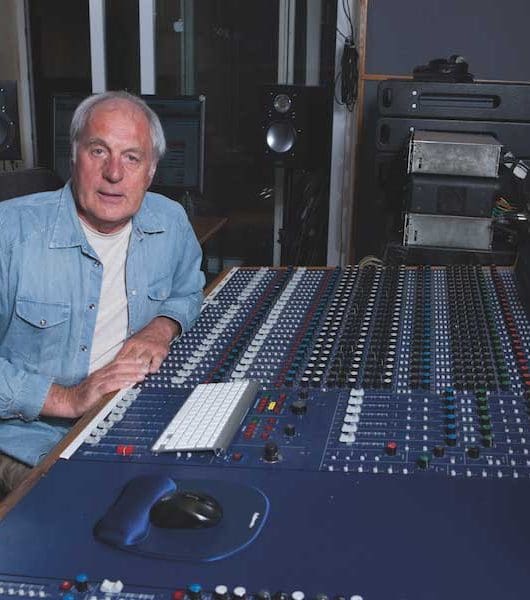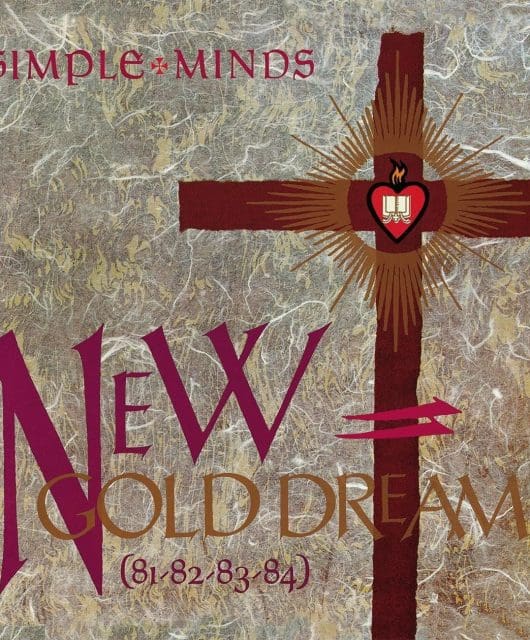Keep The Faith: Chvrches interview
By Classic Pop | July 24, 2018
Scottish indie chart-botherers Chvrches relocated to the U.S. to make album number three, Love Is Dead, and came up trumps with one of the year’s most righteous records. The trio talk to Classic Pop about speed-dating producers, working with Dave Stewart and how to stay cool around your heroes… Written by John Earls.
 It’s 11.30am on a Friday in New York. Spring has started in earnest – but Chvrches, the three-headed pop phenomenon from Glasgow, are here and it’s tipping it down… “This is classic Scottish weather, there’s no denying that,” announces the baseball-capped keyboardist/sampler Martin Doherty as Lauren Mayberry, the band’s upbeat singer, surveys the grey skies. Immediately lightening the mood she beams: “I’m feeling very efficient and productive. I’ve already done my recycling, gone shopping and been to the gym.”
It’s 11.30am on a Friday in New York. Spring has started in earnest – but Chvrches, the three-headed pop phenomenon from Glasgow, are here and it’s tipping it down… “This is classic Scottish weather, there’s no denying that,” announces the baseball-capped keyboardist/sampler Martin Doherty as Lauren Mayberry, the band’s upbeat singer, surveys the grey skies. Immediately lightening the mood she beams: “I’m feeling very efficient and productive. I’ve already done my recycling, gone shopping and been to the gym.”
The pair are joined by the perma-enthusiastic keyboardist/guitarist Iain Cook and, despite the rain following them from Scotland, the trio are in a cheery mood… and they have ample reason to be. After two albums made at their own studio on a Glasgow industrial estate, Chvrches now all live in New York – and the change of scenery has made for their most adventurous and defiant pop album yet.
You can take Love Is Dead at face value and luxuriate in an album stuffed with anthemic bangers if you want. But that would be to ignore Mayberry’s progression as one of pop’s smartest lyricists, fitting wise advice and yearning restlessness around a succession of infectious hooks.
Cook’s description of the epic Graves as being: “So triumphant and so defeated at the same time,” is a fine summary of the album as a whole. “That is kinda how I feel at the moment,” nods Mayberry.
With production and writing input from Greg Kurstin (hitmaker for Adele, Foo Fighters and Lily Allen) and pop behemoth Steve Mac, whose credits include Leona Lewis, The Wanted and JLS, Love Is Dead is a record that expands the band’s world, but retains the crackling energy that has made Chvrches a byword for uncompromising intensity.
This is no surprise, considering the trio seemed determined to make their new working life in New York as unglamorous as possible.
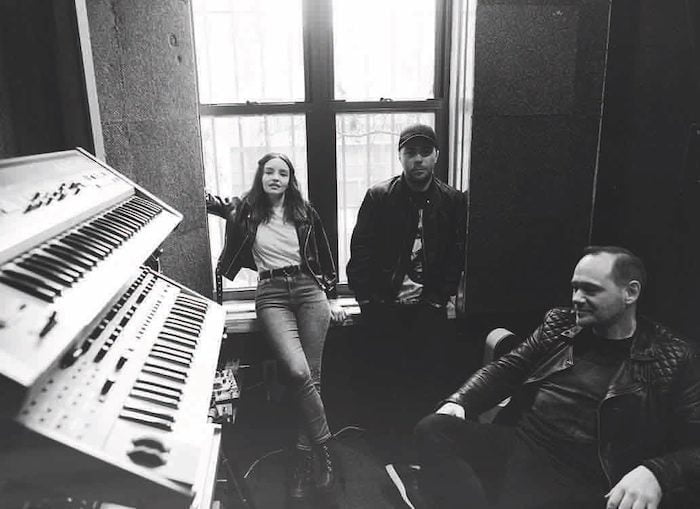
A Bite of the Big Apple
Mayberry was the first Chvrch to move to New York, at the start of 2016, determined to see if the city lived up to the romantic vision of musical inspirations such as Debbie Harry and Karen O. She also needed new vistas to write about.
“I’d written as much as I could at my kitchen table in Glasgow,” she smiles. “I just didn’t want to write the same songs over again. Whenever we start a record I get a psychological block. Even though that block is just psychological, it’s there. And putting myself in a different place gave me a different mindset. Coming here took me outside of my comfort zone.”
The singer was soon joined in New York by Cook, whose American girlfriend lived there. “I had loved the city whenever I’d visited, and I soon fell in love with the place once I was living here,” he says.
And the relationship? “That didn’t go so well,” he grimaces.“I lost a girl but gained a city.”
If it started to seem natural for Chvrches to make album three in New York, their final member needed persuading. Doherty, a self-confessed homebody, was happy in Glasgow with his young family. “Martin did complain about the idea,” admits Cook. But he was eventually won over by the idea of fresh inspiration, however lonely it got being so far away from his family. “It was fraught,” he states simply. “Those first six months were pretty difficult.”
At least the music owed soon enough, helped by some familiar home comforts. Doherty takes up the story: “We went from working in an industrial estate in Glasgow to working in an industrial estate in New York. We transported as much gear over as we could, but New York is ludicrously expensive, so we were working in an industrial unit a quarter of the size of ours back in Glasgow. We were recording during the summer, so it was really hot and sweaty. The mood was pretty intense, which brought a different energy to the songs.”
As compelling an interviewee as she is a frontwoman, Mayberry talks in rapid-fire bursts, her words tumbling over each other. “Much of this record is contemplating and questioning life,” she says. “As much as there are negative themes on the album, there’s a desire and a positivity, too. A lot of people are feeling confused and frustrated, so I think they’ll identify with this record.”
Having relocated, it was a natural enough step for Chvrches to alter their previously self-contained writing and recording methods, too.
“Previously it was just the three of us in a dark room,” points out Cook who, aged 43, is the trio’s genial elder statesman. “In a pop culture that’s now so collaborative, that made us an anomaly. We had this ‘us against the world’ idea, and that was right for the first two records. We needed to consolidate our identity. But, having built up that standing, we’ve got the confidence to open up our story to more people.”
In the event, Chvrches tried numerous potential collaborators. “We were speed-dating producers,” laughs Doherty. “The guys at the top of their game, there’s no ego there. Whereas the people on the rung beneath are a bit insecure.”

A Punk Rock Joan Of Arc
The first outside influence to have a dramatic effect was former Eurythmic Dave Stewart. “Dave blew our minds,” says Cook warmly. “He’s the most artistically-minded person I’ve met in this industry – a psychedelic guru. He pushed us in ways that were initially uncomfortable for us, but it paved the way for how we approached the rest of the album.”
None of the five songs they made together appear on Love Is Dead, but the band insist they’re worthy of eventual release.
“Dave gave us some amazing advice,” continues Cook. “In our very first session, he took Lauren to one side and told her: ‘I see you’re trying to be a punk rock Joan Of Arc figure. So why don’t you just fucking do it already?’” How did the singer respond to that? “Lauren’s initial reaction was tempered on reflection,” notes Cook wryly. “She eventually said: ‘You know what? He’s right!’
“We talked a lot about videos. Dave explained how they were part of the whole Eurythmics’ statement, inseparable from the songs once you had seen them. We tend to get pissed off with anything that isn’t music and think: ‘Christ, another thing we have to do!’ But Dave made us realise videos are another way to get our message across. He also introduced us to his signature vodka martini, which soon rounded off the end of our working day.”
If the paring of Dave Stewart with Chvrches wasn’t idiosyncratic enough, they were soon in the studio with Steve Mac – a producer more readily associated with James Blunt than self-contained synth-pop titans.
It proved to be a surprisingly inspired choice, with their headrush collaboration Miracle a highlight of the new album.
Recommended to Chvrches by their A&R man, the trio were blown away. “This album is about experimentation,” points out Doherty. “I’ve never seen anyone with such a killer instinct for a hit as Steve.
“When we were writing Miracle, I was aware that I sometimes pull back when I’m writing a top-line melody, as it can feel too raw and extreme. But Steve would say: ‘That’s it!’ When you’ve got a guy who’s sold 100 million records pointing at you and getting excited, you get so inspired.”

Powerful Pop
During the making of Love Is Dead, Mayberry turned 30. She didn’t think it would be a big deal – “Being in a band is an extended adolescence, so I don’t know if I’ve reached the level of maturity I should have by now” – but it was perhaps inevitable that such a considered writer began to take stock. “I’m more careful about how I treat people,” Mayberry explains. “I can’t tell if I’m more sensitive to life’s insensitivities, or if they’ve always been there and I just haven’t noticed.”
At the same time, Mayberry says the best thing about starting a new decade is being less concerned how others view her. “A lot of people have a lot of opinions about Chvrches,” she laughs. “And I honestly couldn’t give a fuck anymore.”
As is writ large in pulsing new songs such as Graffiti and Heaven/Hell, Mayberry is learning how to channel her anger. “It’s important to realise certain things are fucked and get really upset about them, while trying to find a different way of manifesting that than anger,” she reasons. “Sitting screaming at each other isn’t going to achieve anything and it’ll rot you from the inside. I’m trying to be manageably angry and productive! Nobody is meant to be happy all the time. If I was cheerful all the time, I’d write crap songs.”
That anger is perhaps best expressed in Graves, as powerful and literate a pop song as you could wish for. Its starting point was the line: “They’re leaving bodies in stairwells”, and Mayberry’s determination to wrap a walloping huge pop song around that stark declaration.
The imagery of bodies in stairwells resonates with the Grenfell Tower disaster, but it transpires the lyric pre-dates that tragedy. The line is actually about a sick joke Mayberry was told when she was 18, about the racist killing of teenager Stephen Lawrence.
“You know those guys who think it’s really funny to make edgy jokes and sometimes they’re just nasty?” sighs Mayberry. “When I said that it wasn’t funny, I was just told that I didn’t get it and that they didn’t mean it… Graves is a response to that heartlessness, how humanity can sometimes make excuses for not trying to be better. There’s a base level of that sort of behaviour that just isn’t good enough.”

The National Trust
A far happier experience for Mayberry was the recording of My Enemy, a track which eventually became a duet with The National frontman Matt Berninger.
The two bands initially became friends during the 2016 festival circuit, with Mayberry guesting with the alt-rockers during their headline set at Latitude. Their friendship was cemented when the Brooklyn band asked Chvrches to contribute to 7 Inches Of Planned Parenthood, a series of singles Berninger curated in aid of public healthcare in the US. “Martin sang the male part on the demo,” recalls Mayberry. “But the storytelling style of the song made us all think of Matt. The guys were saying I should email him to ask, but I know he’s such a very busy man. When I finally did email Matt, he replied within half an hour and recorded it the next day. It was the most efficient interaction in the history of rock’n’roll ever.”
So, has Mayberry, a long-time fan of The National, told Berninger how much of an admirer she is?
“We’ve danced around the issue,” she laughs. “I mostly say it in interviews, though. That way I can deny it after and say I was only doing it for press reasons! When you see our name on festival line-ups next to The National and other bands you own seven albums by, it hits home what we’ve achieved. We’ve done shows with Death Cab For Cutie and I’ve seen them live more than any other band in my entire life. I had to say to myself: ‘Maybe don’t actually say that to them, it’ll only make them feel uncomfortable’.”
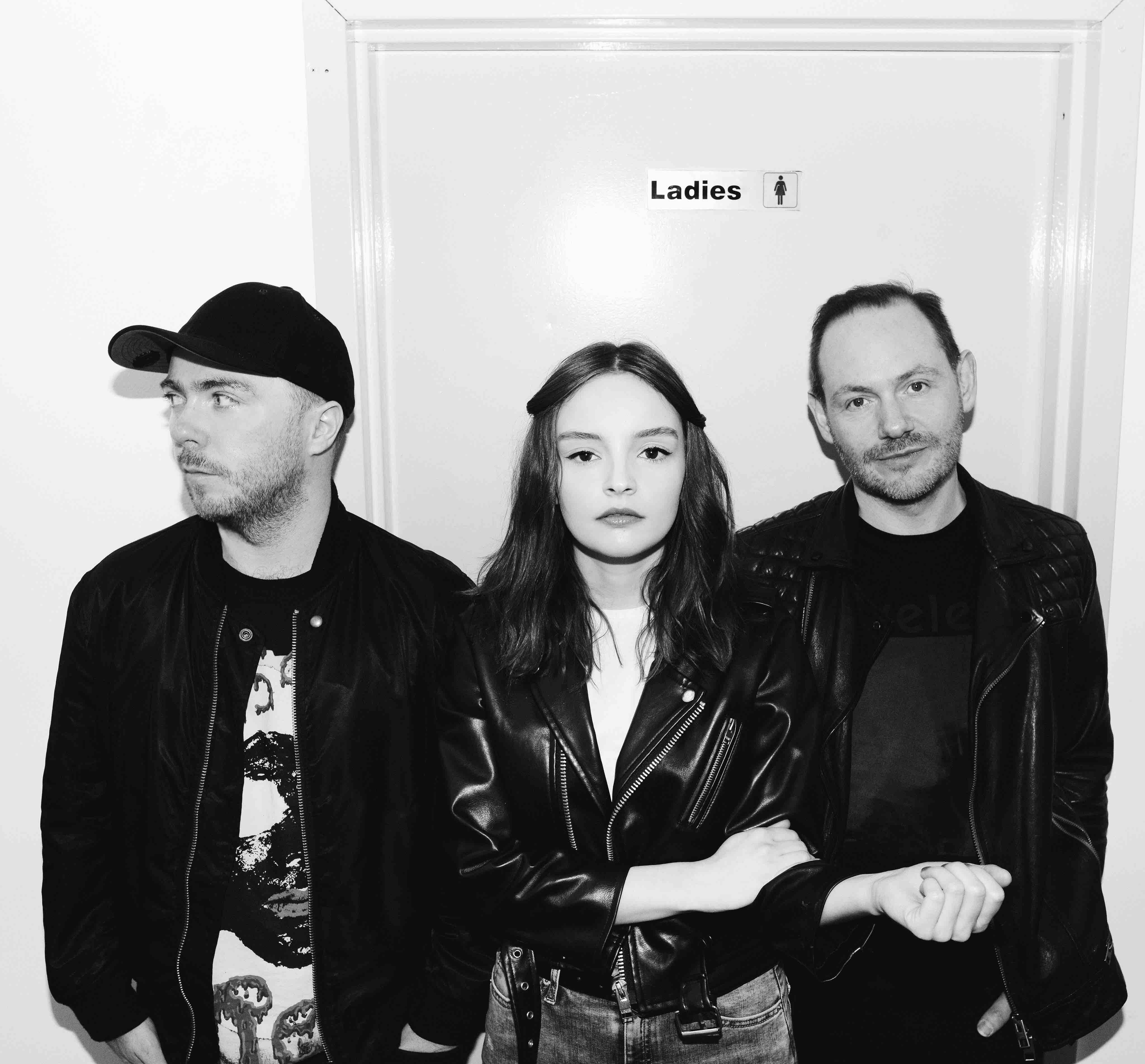
Good Thing Going On
While Mayberry might’ve been slightly hesitant when approaching Berninger, she admits to feeling anxious before working with main producer Greg Kurstin, explaining: “It’s somewhat intimidating going into a room and having to sing for a guy who has recorded Adele and Sia: two of the best female vocalists of all time, let alone contemporary singers. But it was just like having another great keyboard player join the band, rather than a mythical production entity.”
“I thought Greg’s studio was going to be loads of assistants and a car park with people’s names on reserved spaces,” admits Doherty. “It’s the opposite – the most creative space imaginable, alive with the sound of keyboards and the hum of wires on wires.”
If writing the album in New York had been an intense process, recording it with Kurstin in LA was a joy. “I used to think I was at my best musically when I was most intense,” Doherty reveals. “As I’ve grown up, I’ve come to understand how that’s not actually true. I do my best work when everyone is laughing, getting excited and jumping around because we’re on to something good.”
The week before our interview, Doherty had written four new songs. The trio also began a track entitled Blood with Steve Mac they haven’t yet had a chance to finish. So Chvrches’ future seems assured. But will they stay in New York or go back to Glasgow refreshed for album four?
“It’s an interesting question,” ponders Doherty who, having taken the most persuasion to move to New York, is the most passionate in talking about the city’s charms as a resident. “Going back would be good for the soul. We still own the same studio, so I could get the same shit train I did for our first two albums. If you could record that experience in a new way, after the two years we’ve had in New York? That could be immensely positive.”
As for Chvrches’ singer? “We’ll play it by ear. Martin is always talking about the fourth album, where Iain and I are going ‘For fuck’s sake, this one hasn’t been released yet!’ Really, we just need to keep talking to each other.
“So, as long as we’re hiding from the industry at large, we’ll be fine.”
With that, it’s time for Chvrches to retreat from the industry and take on the rest of the world. They’ll do that triumphantly and unbowed. Have faith.

Faith and Devotion
With the questing spirit of classic synth-pop in their DNA, it’s little surprise that Chvrches have worked with synth pioneers Simple Minds. Introduced via a mutual friend, Iain Cook co-wrote two songs on their fellow Scots’ 2014 album Big Music. “Jim Kerr was back in Glasgow after his mum died,” explains Cook. “My friend Martin went to school with Jim and he suggested Jim meet me to write songs as a way of taking his mind off his mum’s passing.”
That led to the reflective Honest Town, about the singer’s Glaswegian childhood, and break-up drama Blood Diamonds.
“We actually wrote about 14 songs,” says Cook. “I still occasionally get emails from Jim. I don’t know if the other tracks will see the light of day, but it was really fun and I’d be up for writing with him again.”
Any dreams for other collaborations? “I’ve been obsessed with Depeche Mode ever since we did some shows with them,” Cook responds instantly.
Chvrches supported Depeche on four stadium concerts in the summer of 2013, two months before debut album The Bones Of What You Believe was released.
“Those guys are gods,” enthuses Cook. “Working with them might be an unreachable dream!
“People think their music is dark and dingy, and in many ways it is. But when you hear 50,000 people sing Enjoy The Silence – an introspective song about loneliness and solitude – it’s one of the most powerful experiences I’ve had. Supporting them lit a fire up our arse.”

Great Scott
When Chvrches began Love Is Dead, they only had one definite plan. “We wanted to sound more like a live band,” recalls Iain Cook. “We’ve always felt like a rock band and all three of us have long histories in rock, so it was inevitable we’d eventually turn in that direction. We’ve stripped it back for this record.
“We want to be less reliant on backing tracks and computers, so that eventually everything on stage could be played live. That’s not unrealistic, especially with Love Is Dead, which was written with a live set-up in mind.”
Conscious of that, Chvrches’ live line-up has been expanded with the addition of Jonny Scott, session drummer for The Kills. There are plans for a bassist to join the touring band, too. Scott played drums on Gun and Night Sky on debut album The Bones Of What You Believe and was at university with Martin Doherty. “We passed each other in the hall in our first term,” laughs Doherty. “We both had Radiohead t-shirts on, so we nodded at each other. We’ve kept in touch and he is a great keyboardist as well as a drummer.”
Could Scott become a full-time Chvrch? “We’re not thinking that way at the moment. We’re very protective of the dynamic the three of us have in the studio. But it’s not something I’d ever rule out.”
Love Is Dead is out now on Glassnote Records.


